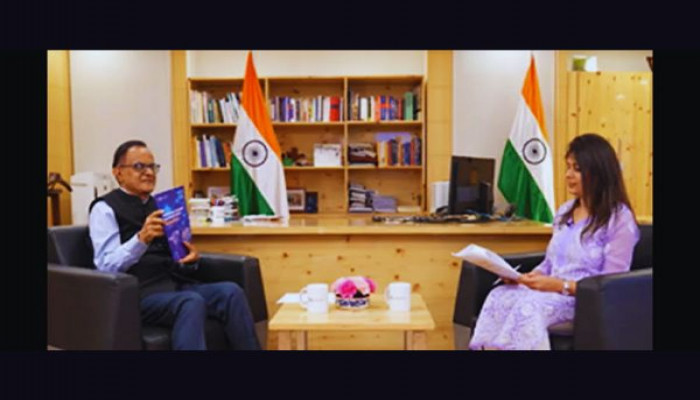India unveils first International Technology Engagement Strategy for Quantum
- In Reports
- 06:34 PM, Apr 14, 2025
- Myind Staff
In a significant development on World Quantum Day 2025, the Office of the Principal Scientific Adviser (PSA) to the Government of India released the inaugural edition of the International Technology Engagement Strategy for Quantum (ITES-Q). This strategy marks a crucial milestone in defining India’s outward-facing approach in Quantum Science, Technology, and Innovation (QSTI), aimed at driving discovery, encouraging innovation, and promoting adoption across key sectors.
Release of the Strategy Report
The official launch took place during the Office of the PSA’s podcast, hosted in celebration of World Quantum Day—an annual event held on April 14. This year’s celebration carries added significance, as 2025 has been designated the International Year of Quantum Science and Technology (IYQST) by the United Nations and its member states.
Prof. Ajay Kumar Sood, Principal Scientific Adviser to the Government of India, unveiled the report, emphasising the importance of the strategy in aligning with India’s National Quantum Mission (NQM) and supporting the broader ambitions of the nation’s scientific and technological community.
A Strategic Blueprint for Engagement
The ITES-Q offers a detailed landscape assessment to support both domestic and international stakeholders—governments, academic institutions, and industries—in developing action plans aligned with their specific objectives in quantum engagement. The strategy complements the goals of India’s NQM and integrates existing efforts by various government agencies, research bodies, and startups.
Prof. Sood underlined the urgent need for India to be a proactive player in the global quantum landscape. “Quantum technology is a domain no nation can afford to lag in—it is essential for achieving strategic autonomy. And without being quantum safe, strategic autonomy remains incomplete,” he stated.
Highlighting gaps and opportunities within India’s quantum sector, he added, “India must invest heavily in quantum hardware to reduce dependency on imports. Growth across all aspects of quantum computing is necessary to achieve this. We must support startups with more funding and reduce risks for investors by creating markets for these products.”
He also stressed the need for India to contribute to global standard-setting efforts. “This is a gap we need to fill urgently. By participating in setting international standards, we move closer to real strategic autonomy. Our market is not just domestic—it's global,” he said.
Insights into the National Quantum Mission
Speaking about the National Quantum Mission, Prof. Sood praised the Department of Science and Technology (DST), which is efficiently implementing the mission under the leadership of the DST Secretary. He described how the mission covers the entire life cycle of quantum technologies—from research and development to turning that R&D into usable technology and scalable market-ready products.
He also explained the hub-and-spoke model adopted by the mission, which includes 152 researchers from 43 institutions, spanning 17 states and 2 Union Territories across India. This model is designed to enhance collaboration and ensure inclusive participation from a diverse set of institutions.
Global and National Ecosystem Mapping
The ITES-Q provides an in-depth look into both India’s and the world’s quantum ecosystems. It examines areas such as investment trends, talent development, institutional capabilities, research output, patents, startups, supply chains, and industrial participation. The report is crafted to promote meaningful partnerships and is particularly aimed at empowering Indian diplomatic missions abroad to bolster bilateral and multilateral collaborations in QSTI.
The launch of India’s first International Technology Engagement Strategy for Quantum marks a pivotal moment in the country’s scientific diplomacy. As India works to position itself as a key player in the evolving quantum space, the strategy seeks to create a roadmap for international cooperation and technological leadership. The ITES initiative, led by the Office of the PSA, is a cornerstone in India’s broader effort to strengthen its presence in critical and emerging tech domains through robust and focused technology diplomacy.







Comments